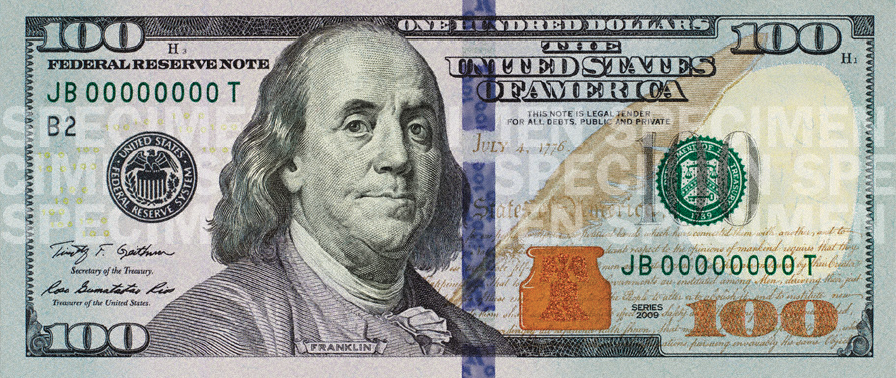“Is Now the Time to Kill the $100 Bill?” That’s the title of a Wednesday, February 17 article in the Wall Street Journal, prompted in part by a blog post from former Secretary of the Treasury Lawrence H. Summers.
The article states that the Treasury Department has no current plans to eliminate the $100 bill, so the suggestion seems for now to come from the ivory tower, but the very question is astonishing. The $100 bill is “America’s most popular currency denomination.” Private enterprises strive to give customers more of the goods and services they want, so why should the US government give people less of the money they want?
One reason given for killing the $100 bill is that large-denomination bills make it easier for bad guys such as drug dealers and human traffickers to do business. They use cash because cash transactions don’t create the traceable records created by checks or electronic transactions, and large-denomination bills like the $100 bill make high-dollar payments easier. But the harm done by drug dealers and human traffickers—the turf wars in American cities, the carnage south of the Mexican border, the undocumented immigrants suffocated in overcrowded trucks, the young women forced into the sex trade—all this horror could and should be eliminated not by less freedom but by more: end the Drug War; open the border to peaceful migration. If drugs could be sold in drugstores and legally imported by reputable businesses, all the violence would drain from the business, as it drained from the alcohol business after the repeal of (alcohol) Prohibition. If peaceful people could enter and leave the U.S. at will, they would have no need to pay a “coyote” to smuggle them through the desert, nor fear of being turned over to ICE for deportation if they decline to work in the sex trade.
Another reason the article gives for killing the $100 bill is that:
Many economists believe the ability of central banks to implement negative-interest-rate policies is hampered by the ability to hold cash. Even in places like Switzerland, where rates have gone negative on government bonds, banks don’t pass on negative rates to retail deposits for fear depositors will withdraw their cash. That limits the effectiveness of lowering rates below zero
Yet rates can go somewhat negative because holding and safeguarding large amounts of currency is an expensive undertaking. The more expensive it is to hold cash, the further negative rates can go and the easier negative rates are to pass on to corporations and consumers. Eliminating high-value currency would increase the cost and difficulty of hoarding cash.
But the government should not be in the business of manipulating interest rates. Interest rates, like all prices, should be set by the free play of market forces. Money, like other goods, should be supplied by the competitive actions of private businesses—banks—seeking to satisfy the public demand for it. That is to say, the Fed’s legal monopoly on currency issue should be abolished, not the $100 bill. (How free-market money-issue and banking would work is fascinating. For those interested, I recommend George Selgin’s The Theory of Free Banking, and pages 224-242 of my book, Free Our Markets, which summarize the core of what I have learned from Prof. Selgin.)
Still another reason given for getting rid of the $100 bill is that doing so would help the government collect taxes. The easier it is to pay cash for transactions, the harder it is for the government to tax those transactions, again because cash transactions create no traceable record.
But reducing the government’s tax take is not a bad thing. The government collects way too much tax as it is, taking money from private citizens who tend to spend or invest it carefully, and giving it to politicians who tend to spend it carelessly. Better to shrink the scope of government and reduce tax rates dramatically so that people don’t have such a strong incentive to avoid taxes.
Having $100 bills to do business with and to save with is extremely valuable to those without banks, and to millions of foreigners who sensibly don’t trust the currency their own governments issue. And it’s a useful convenience to many ordinary citizens. The suggestion that the U.S. government should get rid of it puts the convenience of the government ahead of the convenience of the citizens. Public policy needs to be changed, but in the other direction: end the Drug War; open the borders to peaceful people; free banking; slash taxes. The $100 bill is not the problem.



